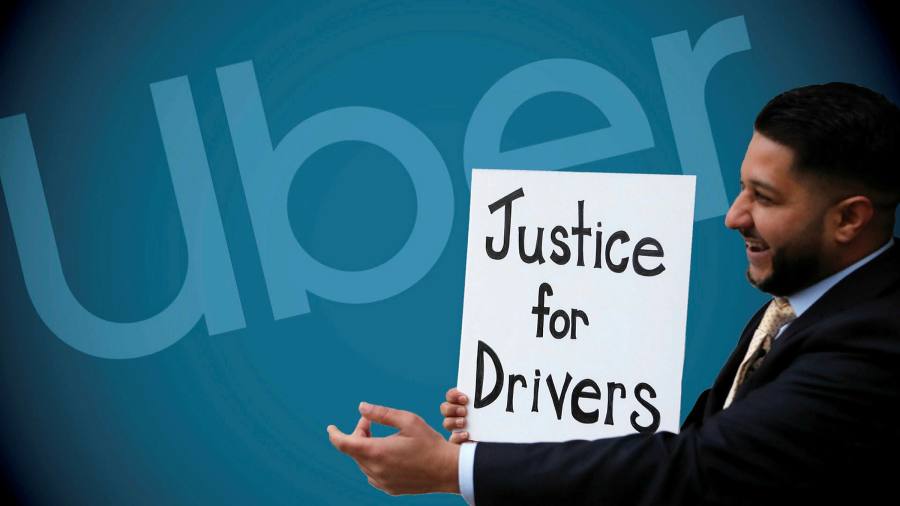[ad_1]
The UK Supreme Court’s ruling on Friday that Uber’s drivers are entitled to workers’ rights sent shockwaves through the ride-hailing industry — with lawyers calling it a “momentous†decision with broader consequences for the labour market.
Yet campaign groups said it underscored the urgency of government action to clarify workers’ status and enforce their rights.
Campaigners have long argued that the rise of the gig economy has fuelled bogus self-employment, with new contractual arrangements and skewed tax incentives leading to workers being wrongly classified as contractors, and so denied the minimum wage, holiday pay and other entitlements.
The issue is acute in the UK, where self-employment has driven employment growth since the 2008 crisis — and the pandemic has cast a harsh light on the precarious conditions of many gig workers.
Friday’s unanimous ruling made it clear that Uber’s drivers should qualify for the legal rights accorded to workers — a status in UK law that falls between that of the self-employed and full employees.
But Jason Galbraith-Marten, the barrister who represented the lead claimants in the case, said the implications went “well beyond the immediate concerns of Uber and its driversâ€, because of the way in which the court had framed its decision.
The court rejected Uber’s arguments, which relied on the wording of the written contracts it requires drivers to sign. These state that when a request for a journey is accepted through Uber’s app a contract between passenger and driver is created.
But the court noted the purpose of relevant employment legislation was “to give protection to vulnerable individuals who have little or no say over their pay and working conditions because they are in a subordinate and dependent conditionâ€.
Employers were often able to dictate the terms of contracts, the ruling said, so taking a written contract as a starting point in determining a worker’s status would simply “reinstate the mischief which the legislation was enacted to preventâ€.
Galbraith-Marten said it was “extraordinary†to see a court saying one should disregard a provision in a written contract, and would make it much harder for both Uber and other companies to avoid significant changes to their business model by making minor tweaks to terms and conditions.
“One fears armies of lawyers will be brought in to tinker with contracts . . . This decision should make it harder,†he said, adding that the focus on subordination and control was “exactly rightâ€.
“It’s both fundamental and very straightforward,†said Rachel Mathieson, a senior associate at the law firm Bates Wells, which represented the Uber drivers. “Precarious work where individuals are reliant on an organisation for minimal bits of work — our economy is full of this type of thing . . . The end-product for users has been prioritised over obligations to individuals delivering those products.â€
The ruling opens the way for thousands of other Uber drivers to sue the company, and could encourage similar challenges against other many other companies that rely heavily on a self-employed workforce — ranging well beyond the so-called “gig economyâ€.
Uber said on Friday that the case had “potentially far-reaching consequences†for the sector and that it would study the verdict carefully to understand the ramifications.
But it maintains that the ruling applies only to those drivers directly involved in the case and that it does not have to apply the findings to others. It says it has already made significant changes since 2016 that give drivers more control and is likely to argue that its drivers prefer flexibility to the fixed shifts that could come with introducing the minimum wage.Â
Moreover, the drawn-out process — an employment tribunal first found in favour of the claimants in 2016 — underscores the difficulty workers face enforcing their rights through the courts.
“If the purpose of the law is to protect workers, why doesn’t the government do it? It can’t be the job of precarious workers to go on a six-year journey. They should enforce the law,†said James Farrar, one of the two lead claimants in the case.
One question is whether HM Revenue & Customs, which is responsible for policing compliance with the statutory minimum wage, will now pursue Uber for past infringements.
HMRC said it could not comment on identifiable businesses but that “we don’t hesitate to take action to ensure that workers receive what they’re legally entitled toâ€.
However, business groups, unions and think-tanks said the ruling underscored the need for the government to clarify the status of workers — with previous pledges to bolster protection for precarious workers still to be fulfilled.
“Rather than leaving all the heavy lifting to the courts, it is time for parliament to debate the questions of employment status in the modern world of work,†said Lindsay Judge, research director at the Resolution Foundation, noting that changing tax incentives that encourage companies to class workers as self-employed would be crucial to make progress.
IPSE, the body representing self-employed professionals, said the judgment showed the “glaring need for clarity†over the rules governing the gig economy, with its director of policy, Andy Chamberlain, saying: “The only way to resolve this tangle is to clarify employment status in UK law.â€
A government spokesperson highlighted recent action to help precarious workers by banning the use of exclusivity contracts in zero-hours contracts, and said ministers would “continue to consider options to improve clarity around employment statusâ€.
“We have always been absolutely clear that employers must take their employment responsibilities seriously and cannot simply opt out of them,†the spokesperson added.
[ad_2]
Source link





